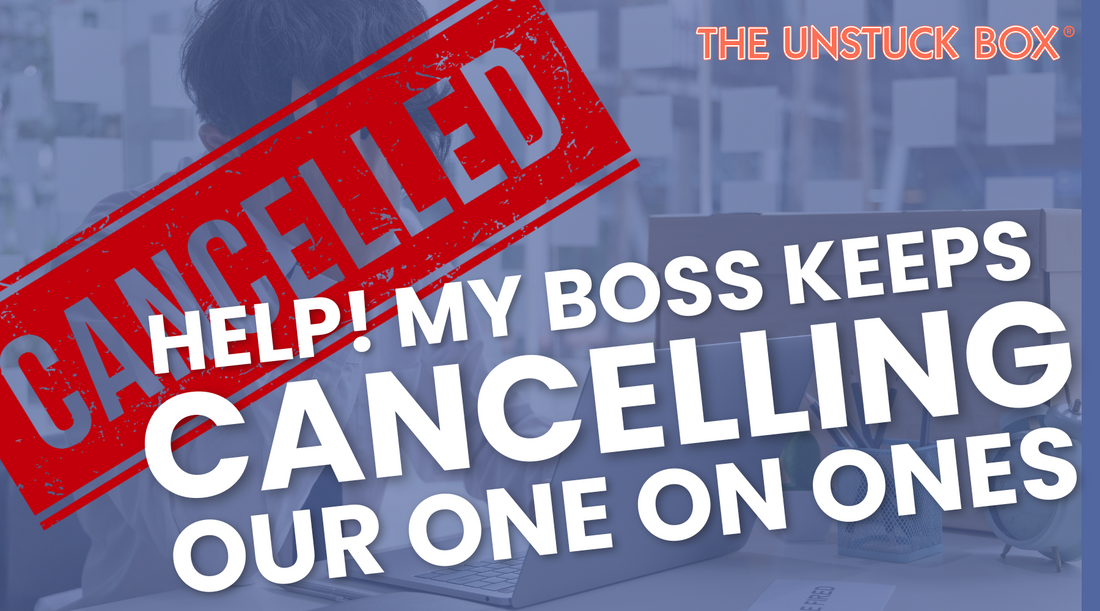Picture this: You've blocked out the time, prepared your talking points, maybe even rehearsed that tricky question about career progression in front of the bathroom mirror. Then - thirty minutes before your scheduled one-on-one - the message arrives: "Sorry, urgent call came up. Need to reschedule."
If this scenario feels depressingly familiar, you're in excellent company. Recent surveys suggest nearly 40% of employees watch their managers treat these meetings like optional extras (a particularly strange workplace affliction, given how much we claim to value people development). The result? Team members left feeling professionally invisible and career-wise becalmed.
But here's the thing - when your manager keeps cancelling these conversations, the damage extends far beyond a diary reshuffling exercise. Your professional growth hits the brakes, crucial feedback gets postponed, and workplace niggles accumulate until they've morphed into proper crises. The good news, however, is that you don't need to sit there waiting for your boss to experience some sort of epiphany.
This guide will walk you through five proven strategies to resurrect your one-on-ones, safeguard your professional development, and forge a stronger working relationship with your manager - even when they seem too perpetually swamped to remember you exist.
Why Your Boss Keeps Cancelling One-on-Ones
Understanding why your manager keeps rescheduling these meetings is the first step toward finding a solution. Most managers don’t cancel one on ones out of malice or lack of interest in their team member’s success. Instead, several systemic factors often contribute to this frustrating pattern.
- Overwhelming workload and competing priorities create the most common scenario where managers feel forced to reschedule meetings at the last minute. When a high priority meeting with senior leadership or an urgent client emergency arises, many managers assume they can easily move their direct reports to later in the week. What they don’t realize is how this pattern erodes trust and disrupts the rhythm of regular communication.
- Remote work challenges have made it easier than ever for managers to postpone face-to-face conversations. Without the physical presence and accountability of office interactions, it becomes simpler to send a quick message saying “let’s catch up next week” rather than maintaining the discipline of scheduled check ins.
- Double-booked calendars and poor time management plague many leaders who struggle to control their schedules. When managers don’t protect time for their team members with the same rigor they apply to external meetings, one on ones become the first casualty when calendar conflicts arise.
- Lack of clear agenda items can make managers deprioritize these conversations. If previous one on one meetings felt unproductive or unfocused, your boss might not understand the value these sessions provide for both performance management and employee development.
- Crisis management mode describes organizations where urgent issues always take precedence over routine check ins. In these environments, managers develop a habit of assuming that everything can wait except the current fire they’re fighting, not recognizing how this approach creates more problems in the long run.
The Real Impact of Cancelled One-on-Ones on Your Career
When your boss consistently cancels one on ones, the consequences extend far beyond just feeling disappointed about a missed meeting. Research from Harvard Business Review shows that employees whose managers hold regular one on one meetings are almost three times more engaged than those whose managers don’t, highlighting just how much these cancelled sessions can damage your professional trajectory.
Missed opportunities for career development discussions represent perhaps the most significant long-term cost. These meetings are where you discuss your goals, seek advice on skill development, and align your aspirations with organizational opportunities. When they don’t happen, you lose months of potential guidance that could accelerate your career progression.
Delayed feedback creates a performance improvement gap that compounds over time. Instead of receiving timely coaching that helps you course-correct or build on your strengths, you end up waiting weeks or months for input that becomes less relevant and actionable with each delay.
Reduced visibility with your manager affects how they perceive your contributions and potential. Without regular conversations, your boss may forget about your recent achievements, miss opportunities to advocate for you in leadership discussions, or fail to notice when you’re ready for increased responsibilities.
Unresolved workplace issues pile up when there’s no consistent forum to address them. Small problems that could be solved in a five-minute conversation during a one on one instead fester until they become major obstacles that require significant time and effort to resolve.
Decreased sense of value and support from leadership affects your overall job satisfaction and engagement. According to Gallup research, the manager accounts for at least 70% of variance in employee engagement, and when team members feel ignored or deprioritized, their discretionary effort and commitment to the organization naturally decline.
Strategy 1: Send a Strategic Pre-Meeting Agenda
One of the most effective ways to prevent your boss from canceling one on ones is to demonstrate their value before the meeting even begins. A well-crafted agenda sent 24-48 hours in advance can transform your manager’s perception of these sessions from “nice to have” conversations to “essential for business success” discussions.
Email your discussion topics with enough advance notice that your manager can mentally prepare and recognize the importance of the conversation. This approach helps busy managers understand exactly what they’ll miss if they reschedule, making them more likely to protect the time on their calendar.
Get specific! Include business impact items that matter to your boss’s goals and the organization’s success. So Instead of listing vague topics like “discuss project status,” frame your agenda items around outcomes: “Review [client] feedback on Q3 deliverables and discuss approach for addressing concerns” or “Align on resource needs to meet accelerated [product] launch timeline.”
Mention any urgent blockers or decisions needed to move projects forward. When your manager sees that postponing the meeting will delay critical work or decisions, they’re much more likely to maintain the schedule. Again, get specific about what you need from them and how delays will impact deadlines or deliverables.
Add one career development question to show your growth mindset and investment in your professional future. This demonstrates that you’re thinking strategically about your role and development, which most managers value in their team members. Examples include asking for feedback on a specific skill area or discussing potential stretch assignments.
Keep the agenda to 3-4 key points to respect their time constraints and show that you’ve prioritized the most important topics. A focused agenda signals that you understand their busy schedule while still ensuring that critical conversations happen (we have sample one on one meeting agenda templates for you to print/download here).
Strategy 2: Propose Alternative Meeting Formats
When traditional hour-long conference room meetings consistently get canceled, it’s time to suggest formats that better fit your manager’s schedule and working style. Flexibility in how you meet can dramatically increase the likelihood that these important conversations actually happen.
Suggest 15-minute coffee walks instead of formal conference room meetings. Many managers find it easier to protect shorter time blocks, and the casual environment often leads to more open conversations. Walking meetings also provide a change of pace that busy managers often appreciate, making them less likely to skip these sessions.
Offer to combine one on ones with existing project check-ins to maximize efficiency. If your boss already has weekly project status meetings, propose adding 10-15 minutes at the end for career development and feedback discussions. This approach piggybacks on meetings that are already prioritized and protected on their calendar.
Request monthly 30-minute sessions instead of weekly 60-minute meetings if your manager’s schedule makes regular weekly meetings difficult to maintain. While less frequent, a longer monthly session that consistently happens is more valuable than weekly meetings that get canceled half the time.
Propose asynchronous updates via Slack or email with quarterly in-person meetings for managers who prefer written communication. You can share regular updates on your progress, challenges, and questions through written channels, then use quarterly face-to-face time for deeper career development conversations and strategic planning.
Ask for standing meetings during their most reliable time slots such as Tuesday mornings before other meetings pile up, or Friday afternoons when they’re wrapping up the week. Many managers have natural patterns in their schedule where they’re more available and focused.
The key is presenting these alternatives as solutions that benefit both of you, not just accommodations for their busy schedule. Emphasize how the format change will make your conversations more effective and efficient.
Strategy 3: Communicate the Business Value
Many managers cancel one on ones because they don’t fully understand the business impact of these conversations. Your job (although it should really be their job!) is to connect these meetings to outcomes that matter to your boss and the organization, making it clear that canceling them has real costs. We recommend many of these approaches in reverse inside our one to ones planner, for example - you're just going to have to take the initiative yourself!
Explain how regular check ins prevent small issues from becoming major problems by sharing specific examples from your own experience or observations. For instance, you might say: “In our last one on one, we caught that client communication issue early and solved it with a simple process change. Without that conversation, it could have escalated into a much bigger problem.”
Share specific examples of how previous one on ones helped deliver better results to demonstrate their concrete value. Document instances where feedback from these meetings improved your performance, guidance helped you avoid mistakes, or alignment prevented wasted effort on the wrong priorities.
Connect your development needs to team performance and project success by showing how your growth benefits the entire organization. If you’re seeking to develop project management skills, explain how this will help you take on more complex assignments and reduce your manager’s workload on future initiatives.
Demonstrate how these meetings help you work more independently and effectively by highlighting examples of increased autonomy that resulted from regular communication. Managers appreciate team members who require less hand-holding, and one on ones are often where this independence develops through ongoing coaching and feedback.
Show the cost of delays when decisions are postponed due to cancelled meetings. Track specific instances where waiting for rescheduled meetings delayed projects, created bottlenecks for other team members, or forced you to make assumptions that later proved incorrect.
Consider preparing a brief summary that you can reference during conversations about meeting importance:
“Our regular one on ones have helped me increase my project delivery speed by 25% this quarter through the feedback and guidance you’ve provided. They’ve also prevented at least three potential client issues from escalating! It's a real help for me to have them regularly, otherwise I notice it takes longer to get clarity on priorities and I’m more likely to wait for your input instead of moving forward confidently.”
Strategy 4: Build Strategic Relationships with Other Leaders
While working to improve consistency with your direct manager, you can simultaneously build relationships with other leaders who can provide the mentorship and development support you need. This strategy ensures your professional growth doesn’t stall while you’re addressing the canceled one on one problem – but it's also just good career advice in general. So:
Identify senior colleagues or skip-level managers who can provide mentorship and guidance on your career development. Look for leaders in your organization who have expertise in areas where you want to grow, or who have successfully navigated career paths similar to your aspirations.
Request informal feedback sessions with cross-functional team leads who work closely with you on projects. These relationships often provide valuable perspectives on your performance and can become important advocates for your work when promotion opportunities arise.
Join employee resource groups to gain exposure to different leadership styles and expand your network within the organization. These groups often provide structured mentorship programs and leadership development opportunities that supplement what you’re missing from cancelled one on ones.
Participate in company mentorship programs to formalize additional support beyond your direct manager. Many organizations offer these programs specifically to ensure employees have multiple sources of career guidance and development support.
This approach serves multiple purposes: it ensures your development continues regardless of your manager’s meeting habits, it demonstrates your proactive approach to professional growth, and it can actually motivate your manager to be more consistent with one on ones when they see you building relationships with other leaders.
Strategy 5: Know When to Escalate
Sometimes, despite your best efforts to improve the situation, a manager’s pattern of canceling one on ones indicates deeper issues that require more significant action. Recognizing when you’ve reached this point is crucial for protecting your career and well-being.
Track cancellation patterns over 3-6 months to determine if this is a chronic issue or a temporary situation related to specific business pressures. Document not just frequency of cancellations, but also how often meetings get rescheduled versus simply skipped, and whether your manager follows through on rescheduling commitments.
Have a direct conversation about your development needs and the importance of regular meetings for your success in the role. Frame this as a professional discussion about what you need to perform at your best, rather than a complaint about their behavior. Say something like: “I’d like to talk about how we can ensure consistent communication to support my development and the team’s success.”
Consider requesting a transfer to a different team with more engaged leadership if the pattern persists and impacts your career progression. This is a significant step that should be carefully considered, but sometimes a change in reporting structure is necessary for your professional growth.
Speak with HR about professional development support if your manager is consistently unavailable for development conversations. This is high-risk, but HR can often provide alternative resources, coaching programs, or mentorship opportunities that fill the gap while you work to improve the situation with your manager.
Evaluate whether this management style aligns with your career goals and timeline honestly. If you’re early in your career and need active mentorship, or if you’re pursuing a promotion that requires strong manager advocacy, persistent meeting cancellations may signal that this isn’t the right role or organization for your current needs.
Before escalating, make sure you’ve documented your attempts to improve the situation and can articulate specific impacts on your work and development. This preparation will help you have more productive conversations with HR or senior leadership if you decide to raise the issue formally.
What Not to Do When Your Boss Cancels Meetings
While it’s natural to feel frustrated when your boss keeps cancelling one on ones, certain responses can damage your professional relationship and make the situation worse. Avoiding these common mistakes is just as important as implementing the right strategies.
- Don’t take cancellations personally or assume you’re being targeted or that your manager doesn’t value your contributions. In most cases, these cancellations reflect your manager’s poor time management, or organizational pressures, rather than their assessment of your worth as an employee.
- Avoid passive-aggressive responses that damage your professional relationship, such as sarcastic comments about their availability, obvious frustration in team meetings, or complaining to colleagues about their behavior. It's a satisfying but very short-sighted response – these reactions rarely improve the situation and often make managers less likely to prioritize time with you.
- Don’t stop preparing or requesting meetings altogether just because they’ve been cancelled multiple times. Giving up on one on ones entirely means accepting that your development and communication needs won’t be met, which ultimately hurts your career more than the frustration of occasional cancellations.
- Don’t let important decisions or feedback wait indefinitely for the next one on one meeting. If something urgent comes up that can’t wait for the rescheduled meeting, send a brief email or request a quick conversation rather than letting issues pile up until they become bigger problems.
Moving Forward: Your Action Plan
When your boss keeps cancelling one on ones, it’s easy to feel powerless and frustrated. However, the strategies outlined in this guide give you concrete tools to take control of the situation and ensure your professional development doesn’t suffer.
Start by implementing the pre-meeting agenda strategy immediately - it requires minimal effort but can have significant impact on how your manager perceives the value of your time together. Then gradually introduce alternative meeting formats and begin building relationships with other leaders who can support your growth.
Remember that changing established patterns takes time, and you may need to try multiple approaches before finding what works best with your specific manager and organization! The key is maintaining consistent effort while protecting your own professional interests through alternative development channels.
Most importantly, recognize that your career development is ultimately your responsibility. While having a supportive manager who prioritizes regular check ins is ideal, your success doesn’t depend entirely on their meeting habits. By taking proactive steps to communicate value, suggest solutions, and build alternative relationships, you can continue growing and advancing even when your one on ones don’t happen as consistently as you’d like.
Track your progress with these strategies over the next few months, and don’t hesitate to escalate or make larger changes if the situation doesn’t improve. Your professional growth and job satisfaction matter, and you deserve consistent support from your leadership team.



